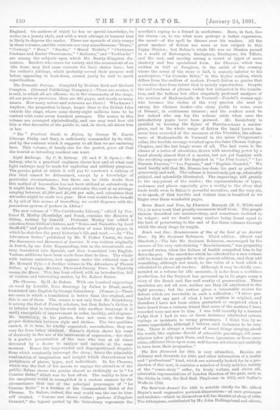The Chouans. By1.1. de Balzac. With one hundred engravings on
wood by Levoi116, from drawings by Julien lo Blant, newly translated into English by George Saintsbury. (Nimmo.)—There are cases in which a translation is bettor than the original, and this is one of them. The reason is not only that Mr. Saintsbury is among the first of French scholars, but that Balza,c's diction is so inferior that in turning his work into another language it is easily susceptible of improvement in order, lucidity, and elegance. Mr. Saintsbury, in his preface, does not seem to draw the proper distinction between style and diction. The two qualities cannot, it is true, be wholly separated ; nevertheless, they are very far from being identical. Balzae's diction shows his want of dexterity in the use of his instrument of expression,—his style is a perfect presentation of the man who was at all times devoured by a desire to analyse and narrate at the same moment. Hence the long-winded and disproportioned disquisi- tions which constantly interrupt the story; hence the admirable combination of imagination and insight which characterises his portaitures of places, typos, and individuals. In Les Chouans, which was the first of his novels to engage tho attention of the public, Balzac shows his genius almost as strikingly as in "La Cousine Bette," which was its last effort. The reality to him of his imaginary world is exemplified in a curious manner by the circumstance that one of the principal personages of "La Cousino Bette" is a brother of the Commandant Hulot of Les Chov,ams. To Balzac, indeed, the real world was the one he him- self created. "Venous aux theses r6elles ; parlons d'Eug6nie Grandet," the legend quoted by Mr. Saintsbury represents the novelist's saying to a friend in misfortune. Here, in fact, lies his charm—or, to use what were perhaps a better expression, the secret—of the spell he throws over his readers. All the great masters of fiction are more or less subject to this happy illusion ; but Balzac's whole life was an illusion passed in a world of Rubempr6s, Rastignacs, Nucingons, Du Tillets, and the rest, and moving among a crowd of types of more shadowy and less specialised form. Les Chouans, which was written in 1827 at Fougeres, in the midst of the country where the scene of the story is laid, is scarcely inferior to his. masterpiece, "La Cousino Bette," in this higher realism, which differs from the realism of modern French fiction as genius that is creative does from talent that is merely reproductive. Despite the awkwardness of phrase, visible but mitigated in the transla- tion, and the tedious but often singularly profound analyses of the motives of Mademoiselle do Vorneuil—Fouch6's woman-spy, who becomes the victim of the very passion she used to entrap the Chouan leader—the story yields to none, even of Dumas', in continuous interest ; and the readers must be. few indeed who can lay the volume aside when once the introductory pages have been perused. Mr. Saintsbury is justified in terming the figure of Marche-a-terre a master- piece, and in the whole range of fiction the lurid horror has never been exceeded of the massacre at the Vivetiere, the adven- tures of Mademoiselle do Verneuil in the miser d'Orgemont's collar, the terrible revenge wreaked upon the false Chouan Galope- Chopine, and the last tragic scene of all. The last scone is the climax of a series of situations, drawn with ascending power by a hand already almost that of a master, but not yet familiar with the revolting aspects of life depicted in "Le Nre Goriot," "Los Parents Pauvres," "Los Paysans," and "Eug4nie Grandet." We need hardly add that Mr. Nimmo has done his part as publisher generously and well. The volume is luxuriously got up, admirably printed, and splendidly illustrated. The engravings add greatly to the enjoyment of the reader ; the representations of types, costumes, and places especially give a reality to the story that lends truth even to Balzac's powerful narrative, and the very air,. so to speak, of that terrible and violent time is breathed as we linger over these wonderful pages.






































 Previous page
Previous page